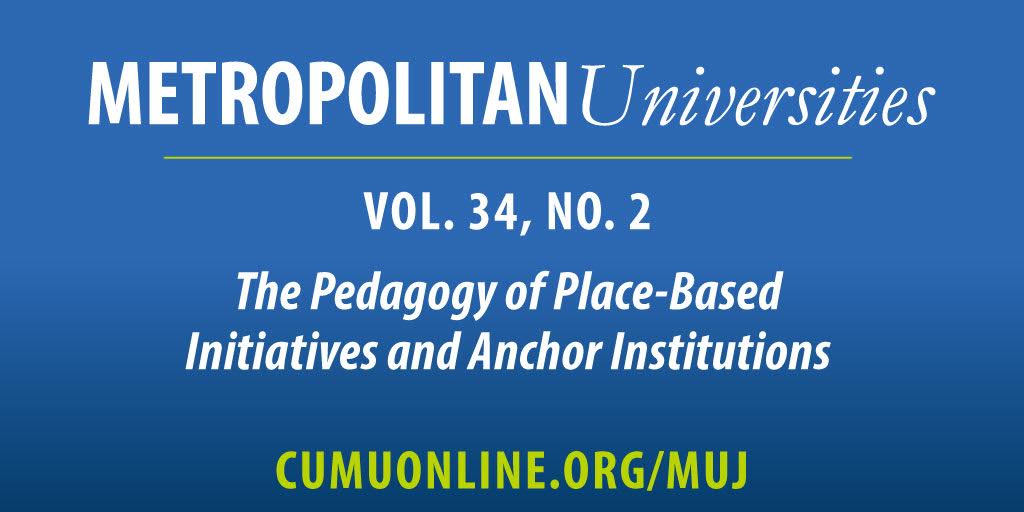Seeking Justice, Seeking Hope
Refugee Resettlement Campuses and Transformative Pedagogy in Higher Education
DOI:
https://doi.org/10.18060/26467Keywords:
Refugee Resettlement, Community Engaged Learning, Place Based PedagogyAbstract
This article focuses on place-based pedagogy developed in partnership with Every Campus A Refuge (ECAR) at Guilford College, which is the first initiative of its kind to mobilize college and university campus resources to provide housing and other forms of assistance to refugees seeking resettlement in the institution’s local area (within and beyond the institution’s physical borders). ECAR is transforming refugee resettlement in the United States as it also transforms our understanding and teaching about the issues faced by these communities, and the role of post-secondary educational institutions. Through ECAR’s commitment to “compassionate hospitality and radical accountability” (Every Campus A Refuge, n.d.), campuses undergo transformations that blur the boundaries between campus and community and redefine the notion of “place” for students and community members. This paper outlines the main place-based curricular components of the ECAR and Principled Problem Solving initiative at Guilford College. We present an analysis of survey data collected from students who participated in the curriculum, and analyze their responses. This data indicate that the academic program’s place-based pedagogy 1) provides students opportunities to learn about what forced displacement is and why it happens; 2) centralizes the voice, agency, and perspectives of the individuals who experience forced migration and resettlement; 3) emphasizes how we can collectively organize and advocate to address the problems of forced displacement and resettlement. In this way, the minor is helping students engage in the work of principled problem-solving in refugee resettlement through specialized course offerings and place-based pedagogy. The paper concludes with challenges and opportunities for campuses interested in adopting this place-based campus refugee resettlement program for their colleges/universities, as well as discuss pathways for further research and pedagogical innovation.
References
References
Abdo, D., & Craven, K. (2018). Every Campus A Refuge: A small college’s engagement with
refugee resettlement. Migration and Society: Advances in Research, 1, 135-146. https://doi.org/10.3167/arms.2018.010112
Bailey, R., Nie, Y. H., K’Briuh, P., Rahlan, T., Hinton, T., & Center for Applied Linguistics (n.d.).
Montagnards. https://cnnc.uncg.edu/wp-content/uploads/2012/08/montagnards.pdf
Cantat, C., Cook, I. M., & Rajaram, P. K. (Eds.) (2022). Opening up the university: Teaching and
learning with refugees (Vol. 5). Berghahn Books. https://doi.org/10.3167/9781800733114
Duff-Brown, B. (2013, March 15). Stanford students visit refugee camps in Ethiopia on
design project. Stanford Center for International Security and Cooperation. https://cisac.fsi.stanford.edu/news/stanford_students_visit_refugee_camps_in_ethiopia_on_design_project_20130315
Every Campus A Refuge. (n.d.). Our global call: For every college and university to host one
refugee family. http://everycampusarefuge.net
Green, P. M., Stewart, C. P., Bergen, D. J., & Nayve, C. (2020). Faith and community
engagement at anchor institutions: Exploring the intersection and turning toward an engagement of hope. Metropolitan Universities, 31(3), 3-21. https://doi.org/10.18060/24784
Guarasci, R. (2022). Neighborhood democracy: Building anchor partnerships between
colleges and their communities. Stylus Publishing, LLC.
Guilford College. (n.d.). Guilford College mission statement.
https://catalog.guilford.edu/student-handbook/mission-statement/
Guilford College. (2022). Underground railroad in Guilford College woods. Hege Library &
Learning Commons. https://library.guilford.edu/c.php?g=656676&p=5029507
Jones, S. (2016). Stealth radicalism: Teaching refugee rights as human rights. Radical
Teacher, 104, 62-72. https://doi.org/10.5195/rt.2016.258
Marx, K. (1867). Capital: A critique of political economy. Volume I: The process of capitalist
production. Charles H. Kerr and Company.
Matheis, C. (2016). Refuge and refusal: Credibility assessment, status determination and
making it feasible for refugees to say “no.” In H. Bauder & C. Matheis (Eds.), Migration policy and practice: Interventions and solutions (pp. 17-35). Palgrave Macmillan. https://doi.org/10.1057/9781137503817
Rueckert, P. (2017, April 20). This college student visited refugee camps in Greece. Then,
she decided to take action. Global Citizen. https://www.globalcitizen.org/en/content/college-student-michigan-refugees-migrants-stories/
Yamamura, E. K., & Koth, K. (2018). Place-based community engagement in higher education:
A strategy to transform universities and communities (1st ed.). Stylus Publishing, LLC.
Yamamura, E. K., & Koth, K. (2019). Leadership practices for place-based community
engagement initiatives. Journal of Higher Education Outreach and Engagement, 23(1), 181-196. https://files.eric.ed.gov/fulltext/EJ1212504.pdf
Downloads
Published
Issue
Section
License
Copyright (c) 2023 Sonalini Sapra, Christian Matheis, Diya Abdo

This work is licensed under a Creative Commons Attribution 4.0 International License.



